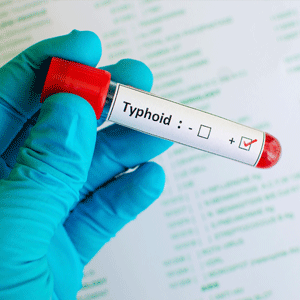
At least 19 cases of typhoid have been reported in South Africa this month alone. But despite the increase in confirmed cases almost every day, health experts have assured South Africans there is no typhoid outbreak.
Professor Lucille Blumberg, head of the epidemiology division at the National Institute for Communicable Diseases, explained that it is a seasonal increase that happens every January.
“We see a number of typhoid cases every month, and those reported thus far neither represent an unexpected increase nor an outbreak. The distribution of cases across the provinces is also in keeping with expected trends,” she said.
“Typhoid is endemic to South Africa and about 100 cases are reported every year. An increase in typhoid cases can be expected at this time of year, on account of seasonal changes or after people have acquired typhoid during their travels in December.”
Typhoid fever is an illness caused by a bacteria called salmonella. It is transmitted when a person comes into contact with food or water that is contaminated with faecal matter, or comes into contact with someone infected with typhoid.
Cross-contamination usually occurs where there is poor sanitation and poor hygiene related to food preparation, or where drinking water is drawn from informal water sources.
Symptoms include fever, nausea, loss of appetite, headache, constipation or diarrhoea, small rose-coloured spots on the chest and an enlarged spleen or liver.
Of the 19 confirmed cases of typhoid, 10 have been reported in Gauteng. An investigation by the National Institute for Communicable Diseases has found that these cases are not linked to each other – except for two siblings who contracted the disease. At least half of the sufferers travelled to an area where typhoid is endemic, like southern Africa, within the month preceding their diagnosis.
Blumberg commended the Gauteng department of health for its swift reaction in identifying and treating typhoid.
However, she noted it was likely that more cases would be reported in the next few weeks as more people return to South Africa from their festive travels in other countries. “Every case reported will be investigated timeously by health officials to confirm the likely source and ensure the health of the public,” she said.
“Healthcare workers at clinics and hospitals are on the lookout for cases of typhoid. They will also ensure other conditions that present with similar signs and symptoms (such as malaria) are appropriately diagnosed and treated.”
If detected early, typhoid can be treated with a one- or two-week course of antibiotics. In more serious cases, hospitalisation and the intravenous administration of antibiotics may be necessary.
Do you know of any more typhoid cases?
SMS us on 35697 using the keyword TYPHOID and tell us about it. Please include your name and province. SMSes cost R1.50




 Publications
Publications
 Partners
Partners









